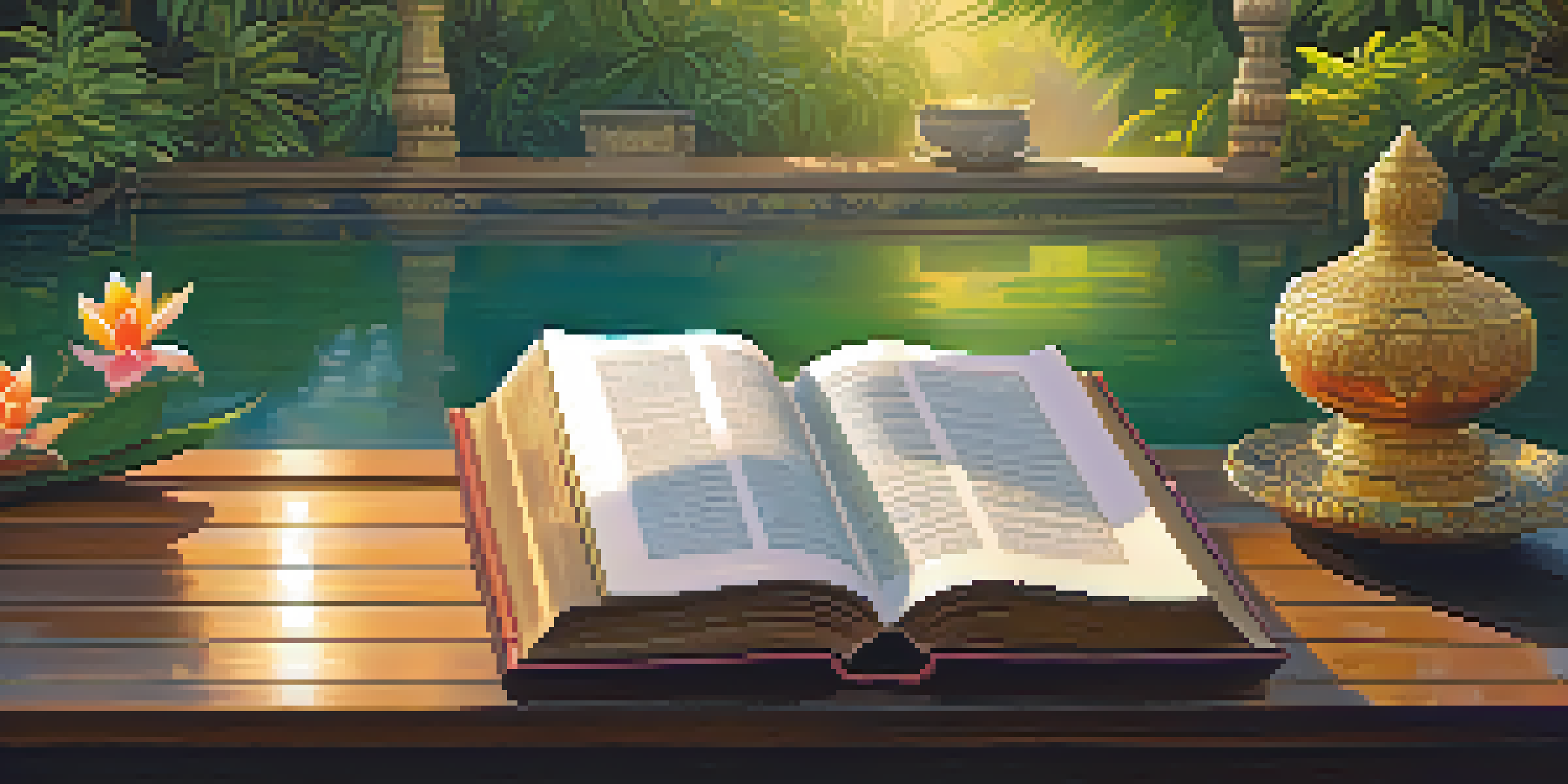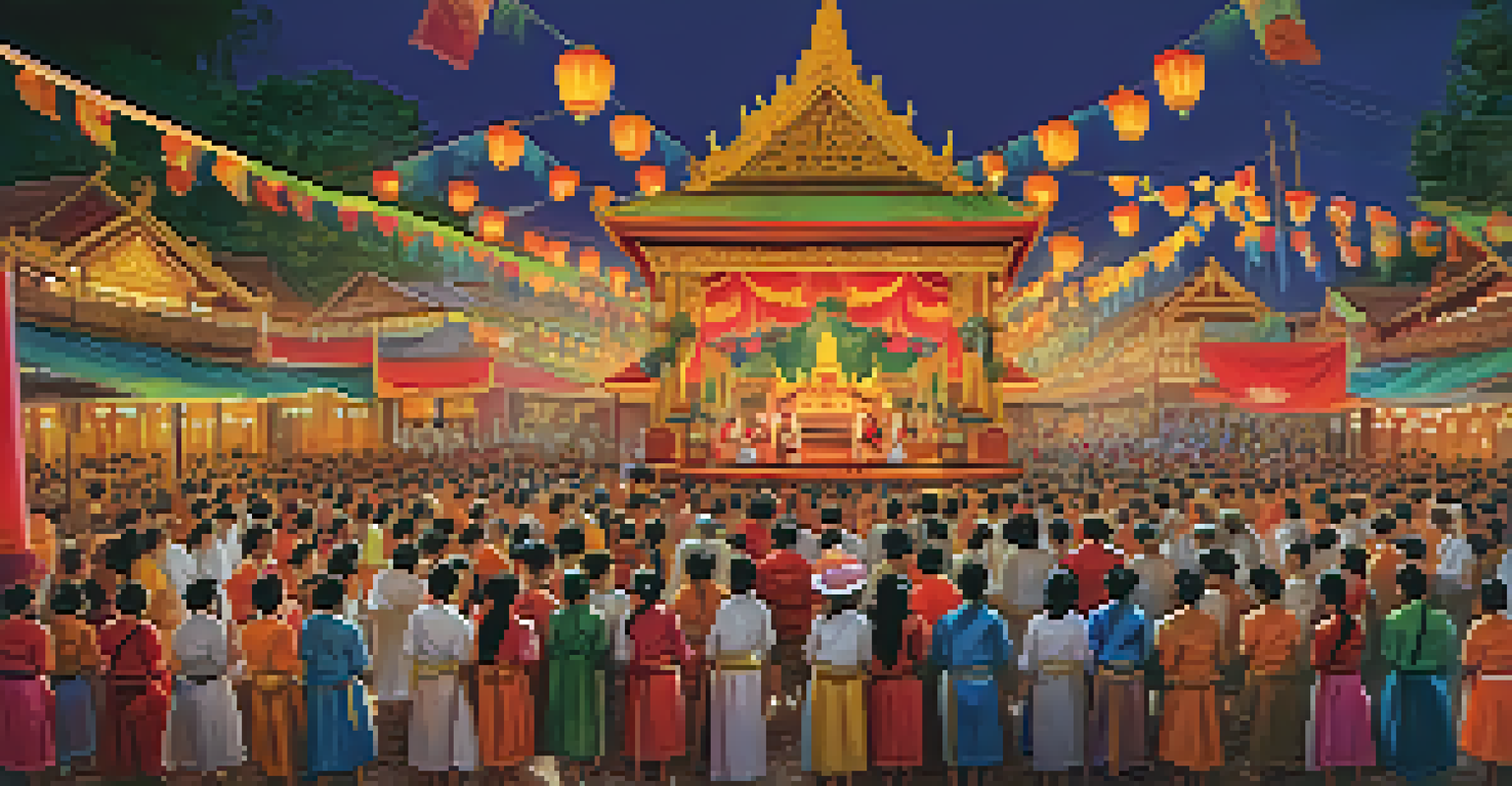The Influence of Thai Literature on Cultural Heritage Today

Understanding the Roots of Thai Literature
Thai literature has deep historical roots, tracing back to ancient texts like the Ramakien, which reflects both religious and cultural values. This epic poem not only narrates stories of gods and heroes but also embodies the moral ideals that Thai society holds dear. By exploring these early works, we can see how literature has been a vessel for passing down traditions across generations.
Literature is a way of preserving the culture and memories of a people.
The unique blend of oral storytelling and written texts in Thai literature showcases the country's diverse cultural influences, including indigenous beliefs, Buddhism, and interactions with neighboring cultures. These elements create a rich tapestry that informs the identity of the Thai people. Understanding this historical context allows us to appreciate how literature serves as a mirror of societal values.
As we delve into the evolution of Thai literature, we find that it has often responded to social changes and political shifts. From classical poetry to modern novels, each form has played a role in shaping the collective consciousness of the nation. This ongoing dialogue between literature and society highlights the dynamic relationship that continues to influence Thai cultural heritage.
Key Themes in Thai Literature and Their Significance
One of the prominent themes in Thai literature is the relationship between humans and nature, which reflects the country's deep connection to its environment. Nature often serves as a backdrop for stories, symbolizing harmony and the delicate balance of life. This theme resonates with readers today as they navigate modern challenges in sustainability and environmental awareness.

Another recurring theme is the concept of love, expressed through various forms such as familial love, romantic entanglements, and even love for one's country. These stories not only evoke emotional responses but also reinforce the importance of relationships and community in Thai culture. They remind us that love is a universal language that transcends time and connects people.
Thai Literature Reflects Cultural Values
Rooted in history, Thai literature conveys societal ideals and traditions that resonate through generations.
Moreover, the exploration of identity and self-discovery is prominent in contemporary Thai literature. Writers often portray characters grappling with their place in a rapidly changing world, reflecting broader societal struggles. This theme resonates with readers, especially younger generations, who are seeking to understand their identities amid globalization and cultural shifts.
The Role of Folktales in Preserving Thai Culture
Folktales have always been an integral part of Thai literature, acting as conduits for cultural values and teachings. These stories, often rich with moral lessons, are passed down orally and have been adapted into various art forms like dance and theater. The preservation of folktales ensures that traditional wisdom is not lost, fostering a sense of continuity in Thai heritage.
Stories are the foundation of culture; they define who we are and where we come from.
Through folktales, we can see reflections of Thai social norms, beliefs, and values, providing insight into what is deemed important in society. For instance, tales of honesty and bravery encourage virtues that are celebrated in everyday life. This storytelling tradition not only entertains but also instills a sense of cultural pride and identity.
In today's digital age, folktales are being reimagined and retold through modern mediums, from animated films to social media. This evolution highlights the adaptability of Thai culture and literature, ensuring that these timeless messages resonate with younger audiences. By embracing modern storytelling techniques, the essence of folktales remains vital to cultural heritage.
Contemporary Thai Literature: Voices of Change
Modern Thai literature has emerged as a powerful platform for social commentary and reflection on contemporary issues. Authors are increasingly addressing topics such as gender equality, political unrest, and environmental concerns, using their narratives to challenge the status quo. This shift indicates a growing awareness and engagement with pressing societal matters.
The rise of diverse voices in contemporary literature has enriched the landscape, allowing for a broader representation of experiences. Female authors, in particular, are breaking barriers and sharing unique perspectives that were historically marginalized. Their stories offer fresh insights into the complexities of Thai society, fostering empathy and understanding among readers.
Folktales Preserve Thai Heritage
Folktales serve as vital conduits for cultural values, ensuring that traditional wisdom is passed down and adapted.
As contemporary literature continues to evolve, it serves not only as a form of artistic expression but also as a catalyst for change. By highlighting social issues and sparking conversations, modern Thai writers play a crucial role in shaping cultural identity and promoting progress within society. Their contributions ensure that literature remains a vital part of Thailand's cultural narrative.
Thai Literature and Its Global Influence
Thai literature is beginning to make waves on the global stage, with translations and adaptations introducing international audiences to its rich narratives. Authors like Jiranan Pitpreecha and Duanwad Pimwana have gained recognition beyond Thailand, showcasing the depth and diversity of Thai storytelling. This global exposure highlights the universal themes present in Thai literature, bridging cultural gaps.
Through literature festivals and international book fairs, Thai writers have the opportunity to connect with global audiences and fellow authors. These events foster cross-cultural dialogue and collaboration, allowing for the exchange of ideas and experiences. Such interactions not only enrich Thai literature but also contribute to its evolution in a global context.
Additionally, the rise of digital platforms has made it easier for Thai writers to reach international readers. Online publications and social media allow for the sharing of stories, poems, and essays, creating a vibrant community of literary enthusiasts. This digital presence enhances the visibility of Thai literature and encourages a broader appreciation of its cultural significance.
The Educational Role of Thai Literature
Thai literature plays a vital role in education, serving as a medium for teaching language, morality, and cultural values. Schools incorporate literary works into their curricula, allowing students to explore themes and narratives that resonate with their own experiences. This engagement fosters a love for reading and critical thinking skills among young learners.
Moreover, literature serves as a gateway for students to understand their heritage and history. By studying traditional texts and contemporary works, students gain insights into the evolution of Thai culture and society. This knowledge not only enriches their education but also cultivates a sense of pride in their cultural identity.
Contemporary Voices Drive Change
Modern Thai literature addresses pressing social issues, enriching the narrative landscape with diverse perspectives.
In a rapidly changing world, literature also provides a means for students to navigate complex social issues. Through discussions of diverse narratives, students learn to empathize with different perspectives and appreciate the richness of cultural diversity. This educational approach equips the next generation with the tools to engage thoughtfully with the world around them.
Preserving Thai Literary Heritage for Future Generations
As Thai literature continues to evolve, efforts to preserve its rich heritage are more crucial than ever. Libraries, cultural organizations, and educational institutions are working to digitize and archive literary works, ensuring they remain accessible to future generations. This initiative not only safeguards valuable texts but also promotes ongoing engagement with literary heritage.
Community programs and workshops focused on storytelling and writing are also vital for nurturing new talent and preserving traditional forms. By encouraging local authors and storytellers to share their work, these initiatives help keep the literary tradition alive. They create a supportive environment for creativity and expression, ensuring that diverse voices are heard.

Furthermore, promoting awareness of Thai literature through cultural events and festivals fosters appreciation among the broader community. By celebrating literary achievements and encouraging discussions, we can cultivate a collective consciousness that values and respects the past while looking towards the future. This commitment to preservation ensures that Thai literature remains an enduring part of cultural heritage.